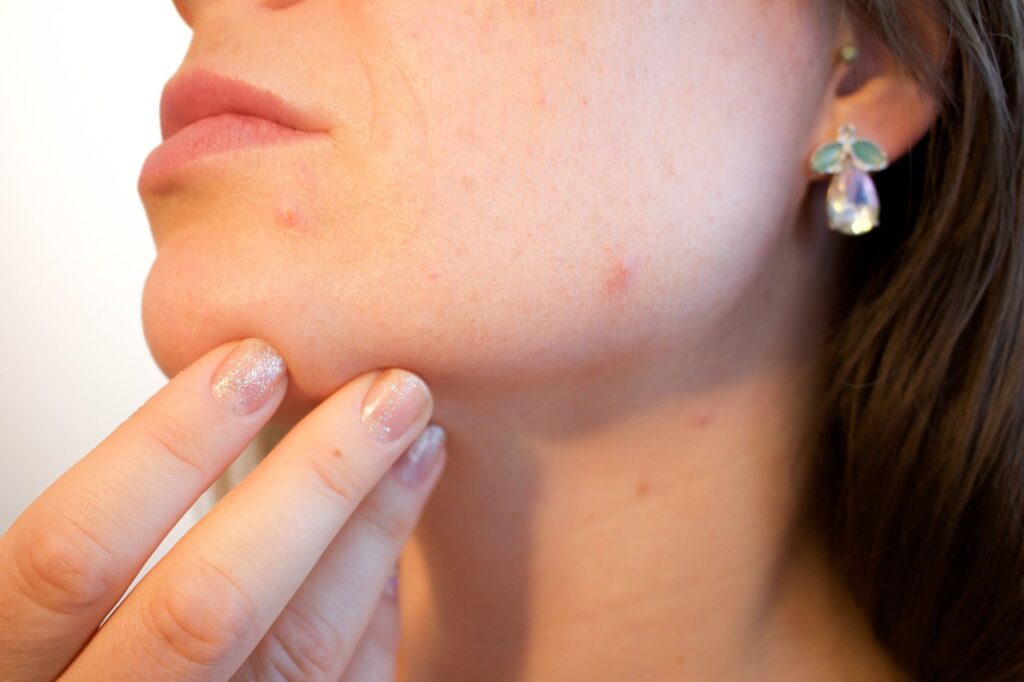If you’ve spent any time in the world of topical skin care, there’s a good chance that you’re familiar with hyaluronic acid (HA), a soothing ingredient found in countless products like serums, moisturizers, and masks. So, what’s behind the surge in popularity, and is hyaluronic acid really good for acne? Join us for a guide to help you determine if it’s right for your skin.
What is hyaluronic acid?
Hyaluronic acid is a naturally occurring molecule found in your skin, eyes, and connective tissues. Let’s explore the basics:
What does hyaluronic acid do?
Known as a powerful humectant, hyaluronic acid draws moisture into the skin, holding up to 1,000 times its weight in water. It can fight inflammation and support a healthy moisture barrier. This substance also hydrates skin without clogging pores or impacting oil production, serving as a great non-comedogenic solution for dry, sensitive skin.
Who should use hyaluronic acid?
Most people, both with and without acne, can benefit from a good hyaluronic acid product. If you use common acne treatments or anti-aging solutions that contain moisture-stripping benzoyl peroxide, salicylic acid, and retinoids, consider adding HA to your skincare routine to restore optimal hydration levels. You can also incorporate it into any anti-aging regimen to plump the skin and combat fine lines.
What are the side effects of hyaluronic acid?
Because hyaluronic acid seeks out moisture from any source, it’s important to pair it with a nourishing moisturizer to ensure it doesn’t pull much-needed hydration from deeper within your skin. In very rare cases, irritation or allergic reactions may occur, so always perform a patch test with each new product.
Related: What Are Biostimulators and What Do They Do?
Can hyaluronic acid help treat acne?
Although hyaluronic acid isn’t a standalone treatment for acne, it offers countless benefits for acne-prone skin and is widely considered a good addition to almost any skincare routine. Here are some of the effects:
Provides deep hydration

Hyaluronic acid’s real superpower is attracting hydration without increasing sebum production or adding pore-clogging oils to the skin.
When used correctly, it can radically restore dry, dehydrated skin.
Reduces inflammation
Acne is an inflammatory condition that can worsen when skin is dry, tight, and irritated. By maintaining a healthy moisture balance and supporting the skin barrier, HA can soothe this irritation, calm redness, and reduce swelling around cystic acne.
Balances the skin’s natural oils
Contrary to popular belief, oily skin isn’t always well-hydrated. In fact, excess oil production is often the skin’s way of compensating for dehydrated skin. Hyaluronic acid is a good acne treatment addition for people with dry and oily skin types alike.
Supports other treatments
Some of the most effective acne treatments strip the skin of natural moisture, which can have a cascading effect on your skin’s overall health. Fortunately, hyaluronic acid can help you restore lost hydration, making it easier to tolerate these topical products long-term.
Can help reduce scars
In addition to plumping the skin with adequate hydration, HA can also reduce the appearance of acne scars by encouraging faster cell turnover rates. With consistency, topical applications may support better healing with more robust cellular regeneration. For severe scarring, you might consider hyaluronic-acid-based dermal fillers to gently restore damaged skin structures.
Read more: What Are the Best Facial Treatments for Acne?
How to use hyaluronic acid for acne
So, is hyaluronic acid good for acne, after all? Absolutely! You just need to incorporate it strategically into your skincare routine.
Choose the right product
A water-based hyaluronic acid serum with pure HA or soothing additives like niacinamide, panthenol, or centella asiatica is a great place to start. Consider solutions that also contain sodium hyaluronate, as it has a smaller molecular weight than hyaluronic acid while offering the same nourishing benefits.
Incorporate into a regular routine
Your skincare routine should include a mild cleanser to remove impurities, a gentle exfoliant to eliminate dead skin cells, and a nourishing moisturizer to lock in hydration. When you add a good hyaluronic acid product for acne management, apply it to damp skin before using your moisturizer and heavier creams and oils. This will give your skin a strong foundation, allowing the HA to hydrate deep within your skin.
Apply regularly
Hyaluronic acid isn’t a single-use solution. It gives your skin a steady supply of hydration to restore moisture levels over time and even prevent dehydration before it happens.
It builds hydration over time and supports a healthy moisture barrier, so your skin is more resilient. However, consistency is key. For the best results, apply it after washing your face in the morning and evening.
Related: Laser Skin Resurfacing: What To Expect Before and After Treatment
Explore acne treatment options at The Wellness Club!
At The Wellness Club, we’re committed to raising the bar in aesthetics, acne treatments, and anti-aging medicine. Using science-backed techniques, cutting-edge tools, and clinical-grade products, we’re passionate about helping our clients achieve transformative results. Ready to learn more? Book a consultation today to get started!

